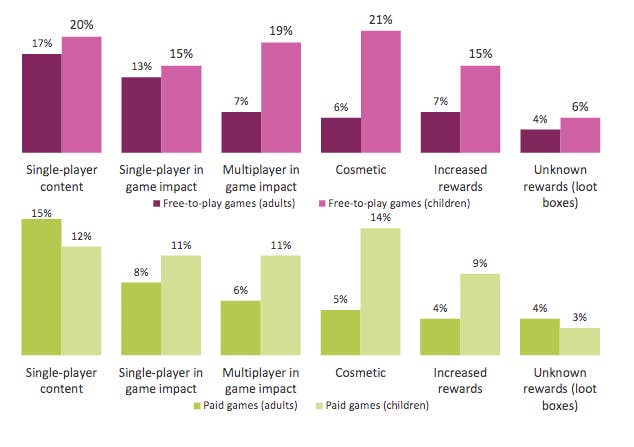Ofcom: Less than 6% of UK children, 4% of adults have purchased loot boxes
Regulator's report also shows game subscription services have yet to take off
A minority of UK games consumers have spent money on loot boxes or in-game purchases with unknown rewards, a new report claims.
The latest Online Nation report from communications regulator Ofcom surveyed thousands of UK adults and consumers about how they interact with all forms of online technology.
Published last week, this year's report shows that only 4% of UK adults who play video games say they have ever bought loot boxes in free-to-play titles, and only 4% have bought them in premium games.
Meanwhile, 6% of game-playing children -- defined as aged five to 15 -- have spent money on loot boxes in free-to-play games, while 3% say they have bought them in premium titles.
It's an interesting figure given the ongoing calls to ban loot boxes or at least regulate them under gambling laws. Just this morning, the House of Lords called for the government to immediately reclassify loot boxes as gambling laws.

When looking at other in-game purchases, it was found that adults are more likely to have bought single-player content -- 17% of those surveyed in free-to-play titles, and 15% in premium.
Children are more likely to have bought cosmetic items -- 21% of respondents have done so in free-to-play, 14% in premium.
Overall, it's a minority of UK players that say they have bought any additional content in video games.
One third (31%) of adults have bought in-game content in free-to-play titles, with 25% saying they have purchased content for premium games.
Children are more likely to have spent money on in-game content. Just under half (47%) have paid for items in free-to-play games, while 33% have spent on premium titles.
The above is based on a survey of more than 1,300 game-playing UK adults, more than 1,000 game-playing UK children. It's worth noting there is no data on how much these respondents have spent.
The report also reveals that subscription services are off to a slow start in the UK. Only 5% of adults and 14% of children who play video games say they subscribe to services that offer them a library of games, such as Apple Arcade and Xbox Game Pass.
By comparison, 16% of adults and 25% of children subscribe to online gaming services such as Xbox Live and Nintendo Switch Online.
It's reported that only 3% of adults subscribe to streaming services such as Stadia.
It's worth noting this survey was taken at the end of 2019. Google's streaming service only launched in November, while Apple Arcade debut in September.
Looking more broadly at the UK's gaming habits, four in ten adults (39%) and three quarters of children (75%) said they played video games in some form during 2019. That's a drop from 44% in 2015 when it comes to adults, and a decrease from 80% for children.
However, the number of children who play games online has risen from 48% to 59% over that five-year period. The number of adults who play online remains relatively flat, recorded as 16% in 2017, up to 17% in 2018, then back down to 16% last year.
UK spending on games has risen from £3.2 billions 2015 to £3.8 billion last year, a slight drop from £4 billion in 2018. The proportion of that money spent on digital games and items has risen from 37% to 51% in the last five years.

